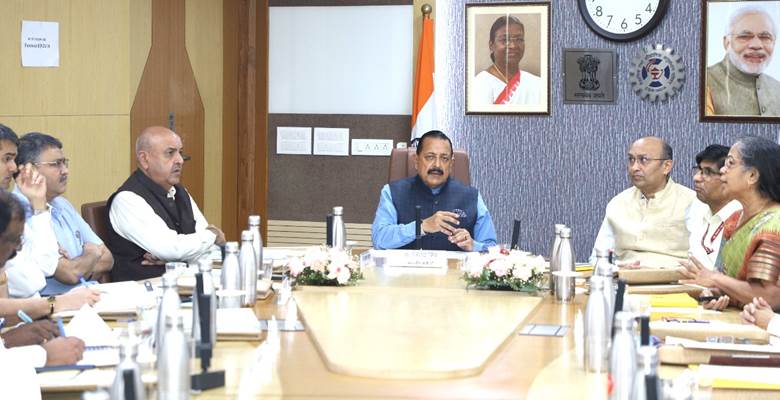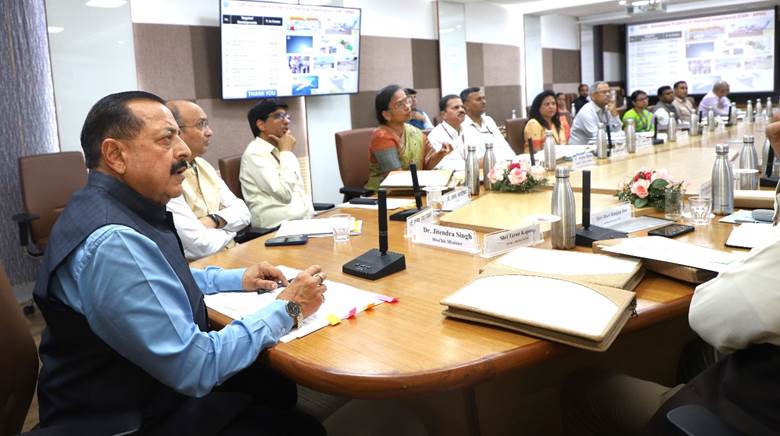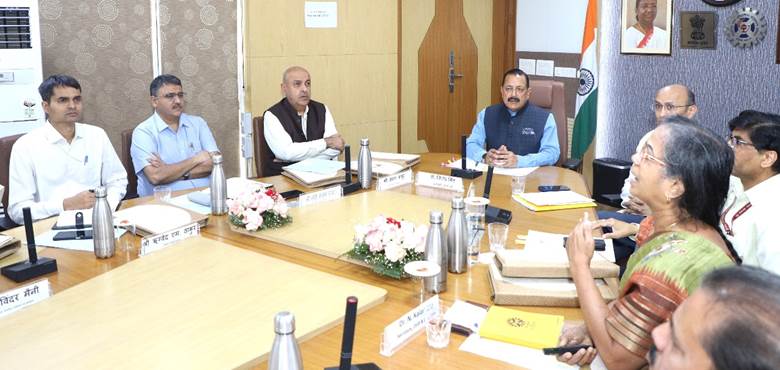Ministry of Science & Technology
“Anusandhan” National Research Foundation (ANRF) to anchor upscaled collaborations involving private players, says Dr Jitendra Singh;
ANRF to Anchor India’s Scientific Future: Dr. Jitendra Singh Charts Roadmap for Cross-Ministry Collaboration
‘No More Silos’: Dr. Jitendra Singh Pitches Unified Scientific Vision
From Lab to Market: Govt Taps ANRF to Turn Research into Scalable Public Goods with commercial viability
Dr. Jitendra Singh Chairs Joint Review Meet of All Science Ministries, Charts Unified Innovation Roadmap
Posted On:
17 APR 2025 10:19PM by PIB Delhi
In a significant move aimed at transforming India’s scientific research and innovation ecosystem into a collaborative and commercially viable enterprise, Union Minister of State (Independent Charge) for Science and Technology; Earth Sciences and Minister of State for PMO, Department of Atomic Energy, Department of Space, Personnel, Public Grievances and Pensions, Dr. Jitendra Singh today called for positioning the newly constituted “Anusandhan” National Research Foundation (ANRF) as a critical organisation for all science ministries and departments across the government and declared that ANRF has been envisaged to anchor upscaled collaborations involving private players.

Chairing a high-level joint meeting of all the science Ministries and departments in Govt of India at the National Science Centre here today, the Minister laid out a vision for aligning research outcomes across departments with national priorities, private sector participation, and market readiness.
At the core of this shift, said Dr Jitendra Singh, is the aspiration to build a unified research strategy that breaks silos, avoids duplication and delivers tangible, scalable benefits to society. “All the science ministries must work with the intent to deliver market-relevant, public-good products,” he emphasised, adding that ANRF will not only act as a coordinating body but also serve as a catalyst to bring in private sector investment and innovation.
The ANRF’s newly appointed CEO, Dr.Shivkumar Kalyanaraman, outlined a bold roadmap that envisions catalytic funding models, deep private sector integration, and AI-led scientific acceleration. The agency is set to model its functioning on globally successful institutions like the NSF and DARPA, launching cross-ministerial missions focused on economic growth and societal impact.

Notably, ANRF is set to launch a “Small Business Deep Tech Innovation” programme inspired by global best practices, aimed at supporting startups and MSMEs in scaling technologies for real-world application. In a bid to maximise national research infrastructure, ANRF will also roll out a “Cloud of Research and Innovation Infrastructure” to allow deep-tech startups and institutions to access underused equipment across the country.
The foundation’s AI-for-Science initiative is another key highlight, focusing on using AI to model scientific equations in physics, chemistry, and biology — a leap expected to drastically shorten the time from theory to practice in core scientific domains.
Dr. Jitendra Singh underscored the importance of projects with visible public utility, citing CSIR’s HANSA-NG aircraft, the Department of Atomic Energy’s Bharat Small Modular Reactors, and space-based applications as models to emulate.
The HANSA-NG, a two-seater trainer aircraft developed indigenously by CSIR-NAL, is already witnessing strong market interest with 110 orders and production lined up in collaboration with Pioneer Clean Arms Pvt Ltd. Dr. Jitendra Singh noted the project’s potential to reduce India’s dependency on expensive foreign pilot training, and suggested roping in private airlines and aerospace component manufacturers to scale up production beyond Bengaluru.
Similarly, the Department of Atomic Energy is developing the Bharat Small Modular Reactor (BSMR), a 200 MW pressurised water reactor intended for industrial applications and grid-independent power generation. These initiatives demonstrate the type of innovation the Minister wants the ANRF to incubate and scale.

India’s space programme also featured prominently in the review. From the recent success of the SPADEX satellite docking to the development of reusable engine technology and advanced space exploration missions, the Department of Space reported rapid strides, including preparations for India’s human spaceflight mission by 2040.
Across the spectrum — whether it’s ocean mining technology from the Ministry of Earth Sciences, bio-manufacturing hubs by DBT, or cutting-edge chips and AI solutions in partnership with semiconductor labs — the government is pushing for synergy, scalability, and sustainability.
Concluding the meeting, Dr. Jitendra Singh reiterated that the future of Indian science lies in integration and innovation. “The time for working in silos is over. We must institutionalise collaboration and deliver solutions that matter,” he said, signalling a new era for India’s science ecosystem — one where policy, private investment, and research institutions converge under the stewardship of ANRF.
The meeting was attended by Tarun Kapoor, Advisor to the Prime Minister; Hari Ranjan Rao, Additional Secretary in the PMO; Prof. Abhay Karandikar, Secretary, Department of Science and Technology; Dr. Rajesh Gokhale, Secretary, Department of Biotechnology; Dr. N. Kalaiselvi, Director General, CSIR and Secretary, DSIR; Dr. V. Narayanan, Chairman, ISRO and Secretary, Department of Space, along with other senior officials.
******
NKR/PSM
(Release ID: 2122587)
Visitor Counter : 1742